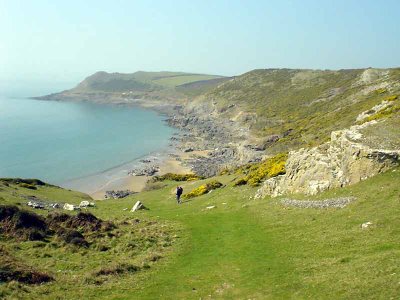 This was one of my favourite surf spots back home on the Gower Peninsula in Wales. This spot was relatively low key until surfers from the local university 'discovered' it. Anyway, there is a nice reef just in front of the cliffs (to the left). On a good swell the wave peaks on the reef and then races left until closing out on the sandy beach. Most of the time it is as flat as it is in this photo as it requires a solid swell but the wave at Fall Bay provided the inspiration for the first surfing passage in Surrendering To The Undertow:
This was one of my favourite surf spots back home on the Gower Peninsula in Wales. This spot was relatively low key until surfers from the local university 'discovered' it. Anyway, there is a nice reef just in front of the cliffs (to the left). On a good swell the wave peaks on the reef and then races left until closing out on the sandy beach. Most of the time it is as flat as it is in this photo as it requires a solid swell but the wave at Fall Bay provided the inspiration for the first surfing passage in Surrendering To The Undertow:From Chapter One, The Endless Lull: The Take Off
"To get down to the beach with a surfboard is actually quite tricky as you have to climb down a steep pathway and scramble over the rocks. But it is well worth it. Once you reach the soft sands, hopefully no one else is there and it is just you and the wind and the waves. You put your leash around your ankle, wade out into the water and then hop on your board and paddle out to the reef. On one particularly low tide I was paddling out and had to duck dive under a wave to avoid being pushed back towards the cliff and as I sank my board under I felt it scrape on the reef. I knew then that waves were going to be good, hollow and powerful. As the more dramatic the change from deep to shallow water the faster the wave breaks. So you paddle out and straddle your board bobbing up and down waiting for the right one. If you are on your own you don’t mind waiting because waiting out in the ocean all alone is almost as important as the actual surfing. Then a good wave comes your way and you are in a good location, you lie back down into a paddling position and start stroking towards the shore, deep, powerful rhythmic strokes, your back is arched, head held high, determined. Then the wave picks you up and you start to get sucked up the face a little, so you paddle a little harder and faster and then there is that tiny minuscule of a moment when you realise that you are now within the wave’s power. At this point most of your work is done but there is still the crucial task of rapidly moving from a lying down position to a standing up one. You are at the top of the wave about to drop down towards the reef with the cliff a little bit too close for comfort, and then you do a quick push up, slide your front foot between your arms, push up further until you are crouching and then quickly standing, you begin the drop. You’ve made it and nothing feels better. Even though everything happened so fast you did not have time to think, there is an enormous sense of relief. You are now looking left, as the wave peels left away from the cliff into the beach, and you dig your back foot down hard, pushing the fins under your board against the water, creating enough pressure for you to lean into the wave. Now you are set up and really surfing. That is it simple. All the hard work is done and from then until the beach everything is effortless. You glide up and down the wave racing ahead of the white water, turning your board on top of the lip, charging for the shoulder, slow down, cut back into the pocket and storm ahead again, up and down the wide open face. All the paddling, positioning, timing, walking to the beach, driving to the coast, all the swell tracking and forecasting, all the waiting, all the in-between frustration, all the mess in your house, the unwashed dishes, the too much drinking and lack of motivation, all the shit in the city, the people, the traffic, the loneliness but crowds, the rudeness, the free for all, the chaos, the erratic non-rhythms within the forced time-table of when to be doing what, it has all paid off. When the wave reaches the shallows and close to the shore you should hold on, surfing until the very last moment, just before it breaks onto dry sand and then you safely kick off the back of the wave, to paddle back out again. And again until the waves stop coming or you physically can’t lift your arms anymore or you are so cold that your testicles (if you have them) have disappeared into your stomach and you are shaking uncontrollably. You can’t feel your toes or fingers, your lips are numb, you have reached the first stage of hypothermia and it feels great."